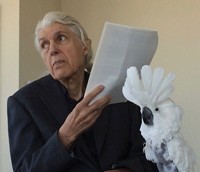Advertisement
Grab your lab coat. Let's get started
Welcome!
Welcome!
Create an account below to get 6 C&EN articles per month, receive newsletters and more - all free.
It seems this is your first time logging in online. Please enter the following information to continue.
As an ACS member you automatically get access to this site. All we need is few more details to create your reading experience.
Not you? Sign in with a different account.
Not you? Sign in with a different account.
ERROR 1
ERROR 1
ERROR 2
ERROR 2
ERROR 2
ERROR 2
ERROR 2
Password and Confirm password must match.
If you have an ACS member number, please enter it here so we can link this account to your membership. (optional)
ERROR 2
ACS values your privacy. By submitting your information, you are gaining access to C&EN and subscribing to our weekly newsletter. We use the information you provide to make your reading experience better, and we will never sell your data to third party members.
Environment
E. V. Murphree Award In Industrial & Engineering Chemistry
Recipients are honored for contributions of major significance to chemistry
by Sophie L. Rovner
February 16, 2009
| A version of this story appeared in
Volume 87, Issue 7
Sponsored by ExxonMobil Research & Engineering Co.
What makes Washington University chemical engineer Milorad P. (Mike) Duduković unique? "Great skill in mathematical modeling, remarkable experimental aptitude, and courage in selecting complex, industrially significant problems for his studies," answers L. Louis Hegedus, retired senior vice president of R&D at Arkema. "He is also an esteemed teacher, a coveted industrial consultant, and winner of important distinctions such as the 1994 R. H. Wilhelm Award in Chemical Reaction Engineering of the American Institute of Chemical Engineers."
Duduković, 64, is the Laura & William Jens Professor of Environmental Engineering. He also heads the industrially sponsored Chemical Reaction Engineering Laboratory (CREL), which tackles reaction engineering problems and then adapts the solutions for industrial practices.
Duduković takes pride in having been designated the best engineering professor of the year five times at Washington University in St. Louis. The university also presented him with the Founders Award in recognition of his teaching and research.
Duduković is currently being honored with the E. V. Murphree Award for developing practical, new methods to quantify multiscale kinetic-transport interactions and new models and experimental tools to study multiphase reactor systems, which are used to make products as diverse as fuels and pharmaceuticals.
His numerous contributions include models that describe the behavior of solid particles during reactions with gases; a model that explains how voids form in fiber composites and how to prevent them; descriptions of transport-kinetic interactions in trickle-bed reactors; and noninvasive techniques that track radioactive particles to monitor phase distributions, flows, and mixing in reactors such as bubble columns and fluidized beds, says Patrick L. Mills, a professor of chemical and natural gas engineering at Texas A&M University, Kingsville, and a former senior research associate at DuPont. Duduković's work has reduced the risk associated with scale-up of chemical reactions, Mills adds.
Duduković believes that the importance of engineering and scale-up is overlooked. "It is assumed that once we understand events on the molecular level, we will be able to convert that to useful applications," he says. "That is simply not so. Many molecular-scale discoveries do not result in the hoped-for new technology due to difficulties in executing them on a commercial scale."
Duduković was born in Belgrade in the former Yugoslavia. He spent summers in the early 1960s in England, picking strawberries for jam factories. With friends he hitchhiked throughout England and Scotland, traveling in trucks and the occasional Bentley. (Complete strangers, including a Scottish gentleman who owned a castle, offered them free lodgings.)
Duduković, who enjoyed math, chemistry, and physics in high school, says he majored in chemical engineering because it "was a perfect way to combine these three sciences and do something useful with them." He earned a B.S. in 1967 at the University of Belgrade and moved to the U.S. the following year. "One of the first scenes I witnessed was the Chicago police cracking the heads of the demonstrators during the Democratic National Convention in Chicago," he recalls.
He remained in the city despite the ruckus, earning an M.S. in 1970 and a Ph.D. in 1972 in chemical engineering from Illinois Institute of Technology. He began his academic career as an assistant professor of chemical engineering at Ohio University, then joined Washington University as an associate professor in 1974. He was promoted to full professor in 1981.
Duduković will present the award address before the Division of Industrial & Engineering Chemistry.




Join the conversation
Contact the reporter
Submit a Letter to the Editor for publication
Engage with us on Twitter